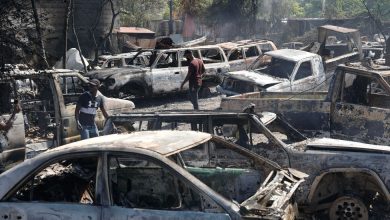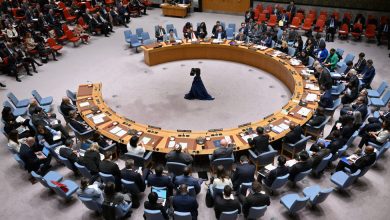Ketanji Brown Jackson Has an ‘African’ Name. I Wish We Knew More About It.

In March, The Times’s Erica L. Green reported that Judge Ketanji Brown Jackson’s parents chose her name from a list “sent by an aunt who was serving in the Peace Corps in West Africa.” As Jackson explained in opening remarks at her Supreme Court confirmation hearing: “When I was born here in Washington, my parents were public school teachers, and to express both pride in their heritage and hope for the future, they gave me an African name, ‘Ketanji Onyika,’ which they were told means ‘lovely one.’”
It’s a beautiful name, and I doubt I am alone among linguists in having wondered, at least briefly: which West African language?
Perhaps Judge Jackson knows. Of course, what really matters in the grand scheme of things is that she’s an exceptionally accomplished jurist and by all accounts an extraordinary human being, and that on Thursday she was confirmed to the nation’s highest court. Yet it bears mentioning that the designation “African name,” even when narrowed down to West Africa, leaves a linguistic shoe undropped.
By some estimates, there are upward of 1,500 African languages and hundreds of languages spoken in western and west-central Africa, from which most enslaved people brought to what would become the United States were taken. These aren’t dialects of some regional language, or even a mere handful of languages. Describing a language as a West African language is as broad a concept as a European language, if not broader. If you were told someone’s name was “European,” you’d think, “Yes, but what kind of European? Greek? Polish?”
I fully get that it can be harder to have a sense of African languages as distinct in this way. Partly, this is because some of them are largely spoken; we don’t experience them static on the page. Also, colonialism has left it that some African nations use European languages in an official capacity — in Equatorial Guinea, for instance, Spanish, French and Portuguese are official languages — making it even less likely that we know any but a few of Africa’s indigenous languages even by name.
Just as most European languages belong to the Indo-European language family, the Niger-Congo family of languages — spoken over an area that extends from Senegal across the southern part of Africa — is the family of indigenous languages most spoken by people across the continent. However, this family has many more languages than does Indo-European, and overall, the languages in it differ more from one another. Many Indo-European languages have a general pattern about them; in terms of grammar, they are like variations on Latin or Russian, varying in how much of the bells and whistles of the grandfather language they hold on to. It is harder to characterize Niger-Congo languages in any single way. They have been developing apart from one another for so long, in such a broad and varied set of contexts, that sometimes you just want to leave it that Niger-Congo contains multitudes.
Lately, it has become clear that part of the reason Niger-Congo seems so especially varied is that linguists who first formally sorted African languages into families had a way of lumping languages together as similar when they were actually different. One big subgroup of languages traditionally grouped within Niger-Congo, Mande, is quite distinct, and it is increasingly thought of as its own separate family.
It’s been pretty obvious to linguists for some time now that Mande (which includes the Mandinka language that Alex Haley had the character Kunta Kinte speaking in “Roots”) was its own thing. But earlier scholars had to start somewhere, and sometimes the lumper is better able to see patterns, and the historical conclusions they can point to, than the splitter. In the case of Mande, this approach didn’t work. Most likely also contributing was a certain essentialization, a Westerner’s ill-conceived notion that indigenous African languages must all be related somehow.
This sort of attitude was reflected in the linguistic grouping of other African languages within the family that covers much of northern Africa, which also stretches a bit across the Red Sea. As a language-nerd kid, I remember seeing this family described in then-aging books as “Hamito-Semitic” — “Hamito” meaning Black languages (of the biblical Ham and his purported curse, get it?) plus the Semitic ones, such as Arabic and Hebrew. To some pipe-smoking white linguists of a certain era, it probably felt right to call this family what may as well have been “Blackity-Semitic,” as if being spoken by Black people inherently made these languages a unit in contrast to the Middle Eastern ones.
And the Mande family — I like writing that — is but one example of this tendency to over-lump African languages. Modern linguists have been showing that a great many languages classified as Niger-Congo on the West African coast and beyond are almost certainly part of families of their own. As the linguist Roger Blench puts it:
That is, these languages are related to no other living ones — and they most likely tell us something about the past. Africa is slowly revealing a picture wherein its languages are different to such a degree indicating that human language has existed there for many thousands of years, evolving into ever differing configurations in the same way as the post-Cambrian tree of life so vividly described in our times by Stephen Jay Gould and Richard Dawkins. The languages reflect that Africa is the cradle of humanity, with awesomely ancient language families having shared space, waxing and waning, many of them having left but a single descendant, others like Mande leaving many more, with a few lucky ones having taken over large stretches of the continent, such as Niger-Congo and Hamito- — no, today we call it “Afroasiatic.”
How might we develop a richer sense of what West African languages are like? My basic blackboard lesson would go something like this: Start at Senegal. When you hear that someone speaks Fula, sometimes also called Fulani, Fulfulde or Pulaar, this is a language in which words are dazzling shape shifters, where first sounds in a word change according to how it’s being used. Then in Ghana, Togo, Benin and Nigeria, languages like Twi, Yoruba and Igbo are, to me, so like Chinese in how they put words together as well as how they use tones.
Then the Bantu languages spoken in the Congos and Angola are a different story again. This is the group that includes Swahili, that now-professor Maulana Karenga, of California State University, Long Beach, adopted in the 1960s as Black America’s heritage language of choice. (The names of the seven principles of Kwanzaa, the holiday conceived by Karenga, are Swahili-derived, for instance.) But Swahili is an East African language likely spoken by relatively few of the enslaved people brought to America. West African languages played a larger role here, and one of the neatest things about them is that many of them divide the past tenses into rigorously fine grains. The Kongo language, for example, has different past tenses depending on whether you are talking about something that happened just now, earlier today, yesterday or before that — and in addition gave us the words “goober” and “zombie.”
It’s understandable that so often, in this country, we speak of “African” food, dance, traditions and languages even while technically aware that Africa is home to dozens of countries overlapping hundreds of cultures. The connection between most Black Americans and Africa is now so distant, and aspects of various African cultures were able to survive only briefly and faintly under the conditions enslaved people labored under in this country. We wind up with the idea of a generic Africanness that is about as peculiar as the idea of people donning berets, sitting in kilts, quaffing steins of lager and eating Swedish meatballs while reading “Anna Karenina” and saying they’re celebrating their European heritage. It’s much harder, of course, for previously enslaved people to preserve language, religion and genealogy over generations. But despite these obstacles, I hope we might develop a somewhat closer-up sense of what a West African language is, especially when a memorable name like Ketanji enters our linguistic consciousness — and the history books.
Have feedback? Send me a note at [email protected].
John McWhorter (@JohnHMcWhorter) is an associate professor of linguistics at Columbia University. He hosts the podcast “Lexicon Valley” and is the author, most recently, of “Woke Racism: How a New Religion Has Betrayed Black America.”



